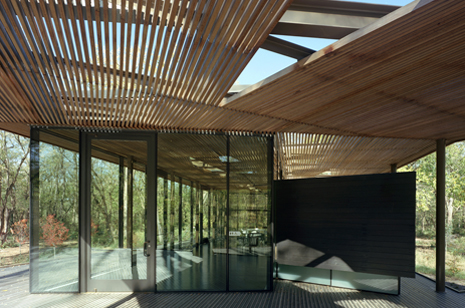FAYETTEVILLE, Ark. – A pavilion tucked in the woods at the Indianapolis Museum of Art and a scenario plan for a streetcar transit system in Fayetteville have both earned national 2012 Honor Awards from the American Institute of Architects. The award-winning works were designed by faculty and staff of the Fay Jones School of Architecture at the University of Arkansas.
The AIA awards are considered the highest national professional honors to be granted to design projects in architecture, urban design and interior design.
The Ruth Lilly Visitors Pavilion, designed by Marlon Blackwell Architect, won an Honor Award for Architecture. According to the AIA website, the Honor Awards for Architecture program “recognizes achievements for a broad range of architectural activity to elevate the general quality of architecture practice, establish a standard of excellence against which all architects can measure performance, and inform the public of the breadth and value of architecture practice.” This is the firm’s first national AIA Honor Award for Architecture.
As Blackwell’s first national public building, the pavilion is both threshold and destination at 100 Acres: The Virginia B. Fairbanks Art and Nature Park, which opened in June 2010 at the Indianapolis Museum of Art.
Blackwell is a Distinguished Professor and head of the architecture department in the Fay Jones School of Architecture at the University of Arkansas, as well as an AIA Fellow.
The design was conceived from porous leaves, found on the forest floor, which had been devoured by insects. Placed among trees, the pavilion is located on the single acre of the 100 in the park that is suitable for construction, due to the pervasive flooding. The structure – made from ipe wood from Brazil, charred cedar wood from Indiana, steel, acrylic and glass – rests on steel posts above landscaped mounds.
“This pavilion is artfully cast in the shadows of the adjacent trees, its transparency is enhanced by its latticed canopy which filters light [through] its entirety and the floor to ceiling glazing hides no secrets,” the jury noted. “Its low posture and horizontal form enhances the encompassing flora and is quite elegant in its lightness while reaching out and inviting nature in.”
An Honor Award for Regional and Urban Design was awarded to “Fayetteville 2030: Transit City Scenario,” a design by the University of Arkansas Community Design Center. The center is an outreach program of the Fay Jones School.
The Regional and Urban Design Honor Awards “recognize distinguished achievements that involve the expanding role of the architect in urban design, regional and city planning, and community development,” according to the AIA website. “The awards identify projects and programs that contribute to the quality of these environments.”
 The “Fayetteville 2030: Transit City Scenario” design integrates the Walton Arts Center into a new shared street through a covered transit plaza. This shared street becomes pedestrian-dominated, but also accommodates motorized vehicles. The design won a 2012 AIA Honor Award for Regional and Urban Design. |
Jury members called the premise of the transit scenario “very forward-thinking.”
“There is a great appreciation for the comprehensive scope of this project as well as the clear visualization of the character of the public space within the scale of infrastructure,” the jury noted. “The preservation of the rural character of the existing town as well as the addition of the more modern elements has been masterfully handled.”
This design project was sponsored by a planning grant from the National Endowment for the Arts, awarded last year, in addition to matching in-kind resources from the city of Fayetteville. The transit city scenario models a future based on development of a streetcar system on College Avenue, connecting the university campus and downtown areas with the Northwest Arkansas Mall. Recognizing that more than 50 percent of Fayetteville’s environment projected to exist by 2030 has not yet been built, the plan shows how 80 percent of future growth could be used to create a model city for smart growth, said Stephen Luoni, director of the center. Luoni is also a Distinguished Professor and the Steven L. Anderson Chair in Architecture and Urban Studies in the Fay Jones School. This is the center’s ninth national AIA Honor Award for Regional and Urban Design.
The 30 winning projects in this year’s awards program will be exhibited at the AIA convention in Washington in May and published in Architect magazine, the official magazine of the AIA.
Topics
Contacts
Marlon Blackwell, head, architecture department
Fay Jones School of Architecture
479-575-4705, mblackwe@uark.edu
Stephen Luoni, director
Community Design Center
479-575-5772, sluoni@uark.edu
Michelle Parks, senior director of marketing and communications
Fay Jones School of Architecture and Design
479-575-4704,
mparks17@uark.edu
